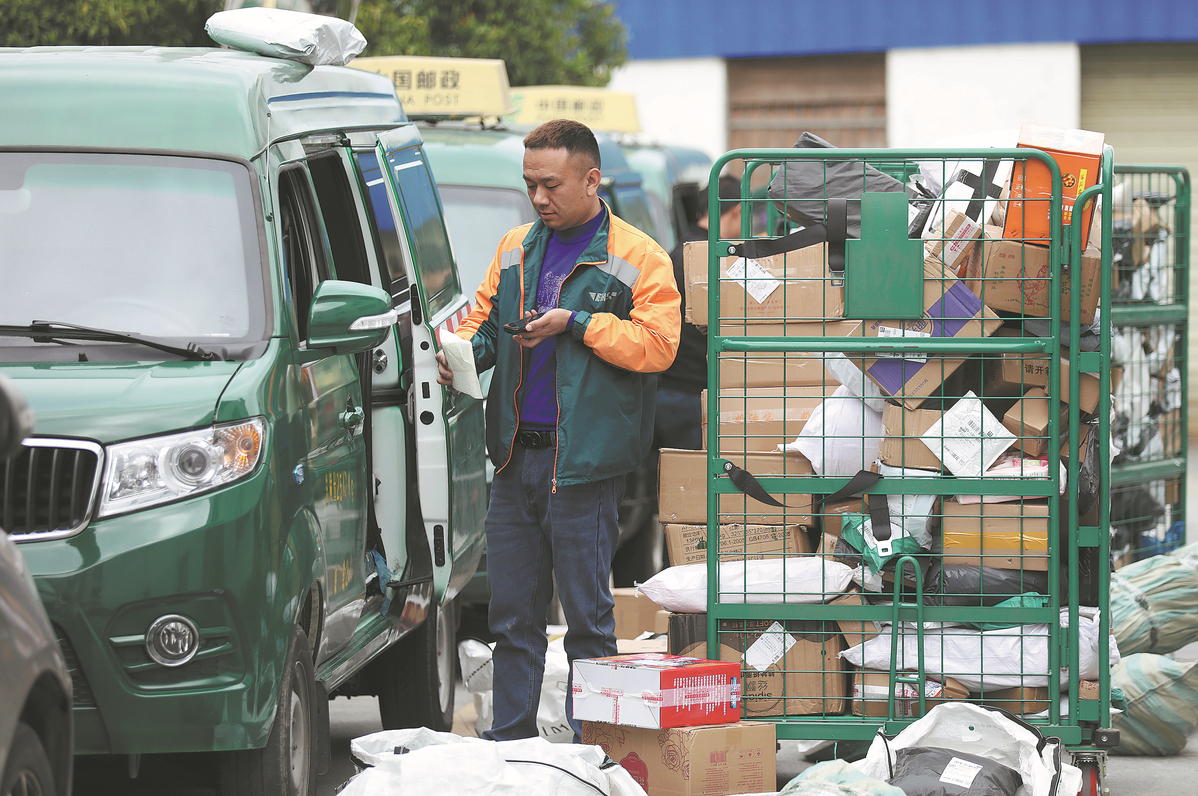Feelings mixed over delivery rule change
New regulation requires couriers to notify customers before dropping off packages
By Luo Wangshu | China Daily | Updated: 2024-03-18 07:04

China's recent regulatory amendment requiring parcel delivery workers to notify customers exactly where they are delivering their parcels to, has stirred a mixed reaction throughout the sector.
At the heart of the amendment, which came into effect on March 1, is that delivery workers can no longer leave packages at community delivery areas without giving customers prior notification, and instead should deliver packages directly to people's doors.
Many community delivery areas were designated in China during the COVID-19 pandemic as a way to limit person-to-person contact and reduce the spread of the virus.
Under the new regulation, couriers or companies leaving packages in community delivery areas without notifying customers in advance could face fines of up to 30,000 yuan ($4,200).
The rule aims to better protect customers' legal rights, according to a statement released by the Ministry of Transport.
The parcel delivery sector in China has grown at great speed in recent years, handling billions of deliveries annually. Last year, 132 billion packages were handled in China. More than 4,100 parcels are generated every second in the country, adding up to about 360 million each day, according to the ministry.
The volume means that an average person in China received more than 90 packages last year.
While many customers have welcomed the amendment, as it allows parcels to be delivered to their doors upon request, some have expressed confusion and annoyance, preferring the old way.
Couriers, too, have voiced complaints about the change, stating that it has created problems for them.
"Couriers now phone me in advance and I tell them to send the parcels to my door if I am home," said a resident surnamed Lu from Chengdu in Sichuan province, adding that some couriers left her packages in the community delivery area in the past.
"I buy things online a lot and receive parcels almost every day. Sometimes I forget what I've bought and the parcels remain in the delivery area for a long time. Now that everything is delivered to my door directly it's more convenient," she said.
However, the 34-year-old also said the countless phone calls from couriers have become bothersome.
Since March, Hou Qingjuan of Liaocheng in Shandong province has received numerous phone calls from couriers, notifying her that her parcels have been left at the community delivery area.
"I prefer the old way so that I'm not getting called all the time," she said.
Some customers, while acknowledging the change, have expressed empathy for couriers.
A resident surnamed Guo in Zhangzhou, Fujian province, said she recently began receiving phone calls from couriers notifying her of the arrival of her parcels.
"It takes much more effort for couriers to deliver parcels to every doorstep, and the delivery fee is low," she said, adding that she appreciates the couriers who ensure fresh products are delivered to her door directly instead of being left in the community delivery area.
"I'm actually willing to pay more for the extra effort," she said.
Guo said she'd prefer couriers deliver parcels to her parents' door too, instead of placing them in the community area, as her parents are older and live in a building without an elevator.
However, not all customers have noticed the change, with some saying that couriers still place packages in the community delivery area without calling.
Chongqing resident Fan Jin said that most of her parcels are still delivered to community shelves and lockers, and she prefers it that way.
"I live alone and order a lot of stuff online. Most of the time, I leave a vague address for safety concerns, and couriers usually leave the packages on the shelves downstairs. They don't know my apartment number," she said.
If she orders some heavy or fresh goods, she usually chooses more bespoke parcel delivery options such as SF Express and JD Express, which are known for ensuring deliveries arrive at the doorstep.
For some couriers, the amendment has created more stress.
Xia Guangbiao, a courier in Xiamen, Fujian province, said his challenges include meeting customer demands, unreasonable requests, communication problems and low pay.
"Since the adoption of the new amendment, there are more customers requiring us to deliver parcels to their doorstep instead of leaving them on the shelves, and we willingly do what that want most of the time," he said. "But some requirements are unreasonable. For instance, a customer required us to deliver eight bags of construction materials weighing a total of 200 kilograms to his home recently. In our region of delivery, cars or motorcycles are prohibited. We had to rent a trolley to deliver the bags, and it cost about 60 yuan. What we earned for delivering the bags in total was less than 20 yuan.
"Some clients also don't answer their phones, and telecommunication companies have even banned our numbers if we make too many phone calls, which makes us unable to do our job if we have to call customers before making every delivery," Xia said.
With the stratospheric rise of e-commerce in recent years, the demands placed upon delivery workers have increased accordingly.
Xia said he and his colleagues have discussed with their delivery companies about adding more people to deliver parcels and also about raising their wages.
He added that many couriers say they are on the brink of quitting their jobs because they think the pay is "worthless".
The rate of pay in the parcel delivery sector ranges from around a high of 2 yuan per parcel delivered, to as little as 0.5 yuan per parcel.























